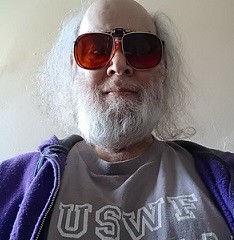Wednesday, May 03, 2017
Can Anthony Joshua, Citizen of the World, Become the Next Muhammad Ali?
by Eddie Goldman
Anthony Oluwafemi Olaseni Joshua does not want to be mentioned alongside the likes of Muhammad Ali.
"Can I ever see a time that it will be Ali, Foreman, Holmes, Joshua? Nah," the 27-year-old heavyweight champ reportedly said.
"There are too many opinions now. They didn't give Klitschko the respect he deserves, you know what I mean. I just try and keep some distance from it and stay in my own lane," he went on.
"As long as I'm happy, that's what matters. I'm not perfect but what I do, I do good. I'll keep improving on it and if that's good enough to get me through in boxing, then I'll be satisfied. I know I can get better."
Despite his most modest self-assessment, there are many of us who argue that he is precisely suited to become potentially as big as was The Greatest.
Back on January of this year, in what now seems like a different and earlier era in boxing, you just didn't hear comparisons of Anthony Joshua and Muhammad Ali. At the January 31 Joshua-Klitschko news conference in New York hyping their April 29 bout, when I told Gareth Davies of the UK's Telegraph that Joshua had the potential to become as popular as Ali, this view ended up exploding onto headlines in the British and Irish media.
Now, after Joshua's momentous and historic 11th round TKO victory over Klitschko this past Saturday before 90,000 fans in London's Wembley Stadium, such comparisons are flooding the general sports and sports business media.
Yes, visions of this fight may still be sharp in many people's minds and the emotions it evoked may still be powerful just days after it made its way into boxing, sports, and cultural history. But that does not mean that these comparisons, and the projection that Joshua could become the next Ali, are simply infatuations which will fade in less giddy times.
Nicely juxtaposed photos of Joshua standing over a downed Klitschko alongside Ali standing over a downed Sonny Liston in similar poses have been plastered all over the British media.
No less than the business publication SportsBusiness Daily, whose audience is far different from that of the British tabloids which promise secret shots of naked celebrities, ran a piece called Anthony Joshua Drawing Comparisons To Muhammad Ali.
Sure, Joshua is only 19-0 with 19 knockouts, with a growing queue of undefeated fighters vying to fight him, including Deontay Wilder, Tyson Fury, Joseph Parker, and Luis Ortiz. But do you know what Ali, then known as Cassius Clay, did in his 19th fight? After being knocked down in the fourth round, he stopped Henry Cooper in the fifth -- before 35,000 people in Wembley Stadium. The more noteworthy, and still controversial, fights with then-heavyweight champion Sonny Liston were fights numbers 20 and 21 in Ali's career.
Of course, besides his years of heroics in the ring, Ali was both adored and hated for what he did outside the ring. (At a media event in 2002 to publicize a one-off Ali magazine, before a crowd of New York boxing and media types I asked Ali which he was proudest of, his accomplishments in the ring or outside the ring. To the amazement of almost everyone except me, he said, in what was left of his voice, "outside the ring.")
Ali's conviction for his refusal to be drafted into the US Army on the grounds that he was a conscientious objector on religious grounds, later overturned by the US Supreme Court, and his stern denunciation of American aggression in Vietnam as racist, led him, then with a record of 29-0, to be stripped of his heavyweight title and banned from boxing by the devils who control it. Almost all the mainstream writers of this supposed classic era of sportswriting condemned him and even refused to call him by his chosen name, Muhammad Ali, with the most notable exception in the mainstream media being Howard Cosell.
He also proudly and loudly trumpeted the Black separatist line of the Nation of Islam he believed at that time, and even broke ties with his mentor Malcolm X, whom many believe was assassinated in a plot concocted with the cooperation and/or participation of Nation of Islam leadership. Ali did later admit regret for his break with Malcolm and apologize to Malcolm's family, and the most moving speaker at Ali's 2016 funeral was the eldest daughter of Malcolm X and Betty Shabazz, Attallah Shabazz.
While Ali's political views clearly moderated after he broke with the Nation of Islam and became a more traditional Sunni Muslim, and culturally he was more or less mainstreamed, he remains an icon for those struggling against war, oppression, exploitation, and discrimination around the world.
What do we know of Anthony Joshua's political beliefs? Not much, publicly at least. What he thinks of Theresa May and Jeremy Corbyn, or Trump, Le Pen, Macron, Putin, Assad, Xi Jinping, and Kim Jong-un, or the 2015 elections in Nigeria, has not been publicized. Where he stands on Brexit, refugees, and LGBT rights is also not publicly known.
But we do know that he is trying to be, whether he calls it that or not, a humanist.
Shortly after defeating American Charles Martin in April 2016 to win the IBF heavyweight belt, his first major world title, Joshua was interviewed by Nigerian journalist Oma Akatugba at the 2016 Laureus World Sports Awards in Berlin. In that video, which has recently gone viral, Joshua, with a laugh, said "the secret of the success" was that he eats the popular Nigerian dishes of eba, pounded yam, and egusi soup.
But more seriously he addressed the issue of his nationality. His mother, Yeta Odusanya (with whom he still lives), is from Nigeria, and his father, Robert, is of Nigerian and Irish descent. He was born in Watford in the UK, but spent part of his youth in Nigeria.
Asked whether he considers his nationality Nigerian or British and "Where does your heart lie?" his response was this:
"We're citizens of the world. All this political stuff where this is British, this is Nigerian, this is -- we're citizens of the world. That's the most important thing. But my heart is with Nigeria, my heart is with Britain. I'm a Nigerian man by blood, yes."
Joshua the internationalist is already a worldwide attraction for boxing and sports fans viewing his fights in many parts of the planet. The Joshua-Klitschko fight was reportedly screened in 140 countries.
According to numerous media reports, promoter Eddie Hearn has already claimed that this fight has shattered the UK record for pay-per-view buys, with numbers still coming in. In Germany, where it was aired it on the RTL network and not pay-per-view, the fight had an average viewership of 10.43 million people. In Poland, where it aired on Polsat Sport, the average viewership was 920,000. It also aired in Russia on Match TV, with no figures available at this time.
In the US, which is becoming more and more a backwater of boxing, the premium cable networks Showtime, which has a deal with Joshua, and HBO, which has a deal with Klitschko, wrangled for months over how to share the TV rights for this fight. They only announced their arrangement less than two weeks before the fight itself, with Showtime airing it live, meaning in the afternoon in the US, and HBO showing a replay that night. Even with all the delays which no doubt handcuffed the proper marketing of this fight in the US, both telecasts drew impressive numbers.
The live Showtime telecast averaged 659,000, and peaked at 763,000, amazing numbers for a fight outside the US that started at about 5 PM EDT/ 2 PM PDT.
One might think that viewership would be hurt for the HBO replay because the results, recaps, analyses, and even YouTube videos could be easily found by anyone who has ever seen the letters "http". Nevertheless, the replay averaged 738,000 viewers on HBO and peaked at 890,000 - making it higher than any of HBO's live boxing shows this year.
Just imagine the number of viewers in the US if the TV suits had put it live on the free CBS broadcast network instead of on premium cable on Showtime. On CBS at the time of the fight was a live broadcast of golf (lol), whose organizers booked the time months in advance, unlike the boxing promoters whose anarchic system requires a separate deal for every fight. This golf showing got 1.5 million viewers, surely far fewer than a well-publicized live broadcast of this fight would have received.
Now Anthony Joshua is in demand all over the world. He reportedly turned down an offer to do a blitz of appearances on American TV talk shows this week, preferring to stay in the UK with his family and friends, and also prepare for some public appearances there.
The Nigerian President Muhammadu Buhari has announced that he will soon invite Anthony Joshua to Nigeria.
Anthony Joshua is indeed a citizen of the world, as was Muhammad Ali, and his reign as the universally regarded top heavyweight in the world is just starting. But unlike Ali, his ascendance to an iconic status like him will not be as dependent on him being recognized as such as widely in America. "America First" hysteria may work for Trump voters, but not in world boxing.
Back at that January 31 news conference, I asked Joshua how he was handling all the hoopla around him and talk about him being the future of boxing. He replied by summing up his situation, matter-of-factly:
"I think it's just going to come with the territory, provided I keep on winning. If I'm getting banged down in my next five fights, we don't hear this talk anymore. So I think, right now I'm winning. This is what we'll continue to hear. Boxing is all based on winning. Boxing is based on winning. It's not as if, 'Oh, he lost three fights. That's good, and ....' Nah. It's based on winning. If I'm winning, we'll talk about unification. We'll talk about Vegas. If I'm not winning, the next man comes up and takes that position."
Labels: Anthony Joshua, boxing, Eddie Goldman, Muhammad Ali
Comments:
Post a Comment
















